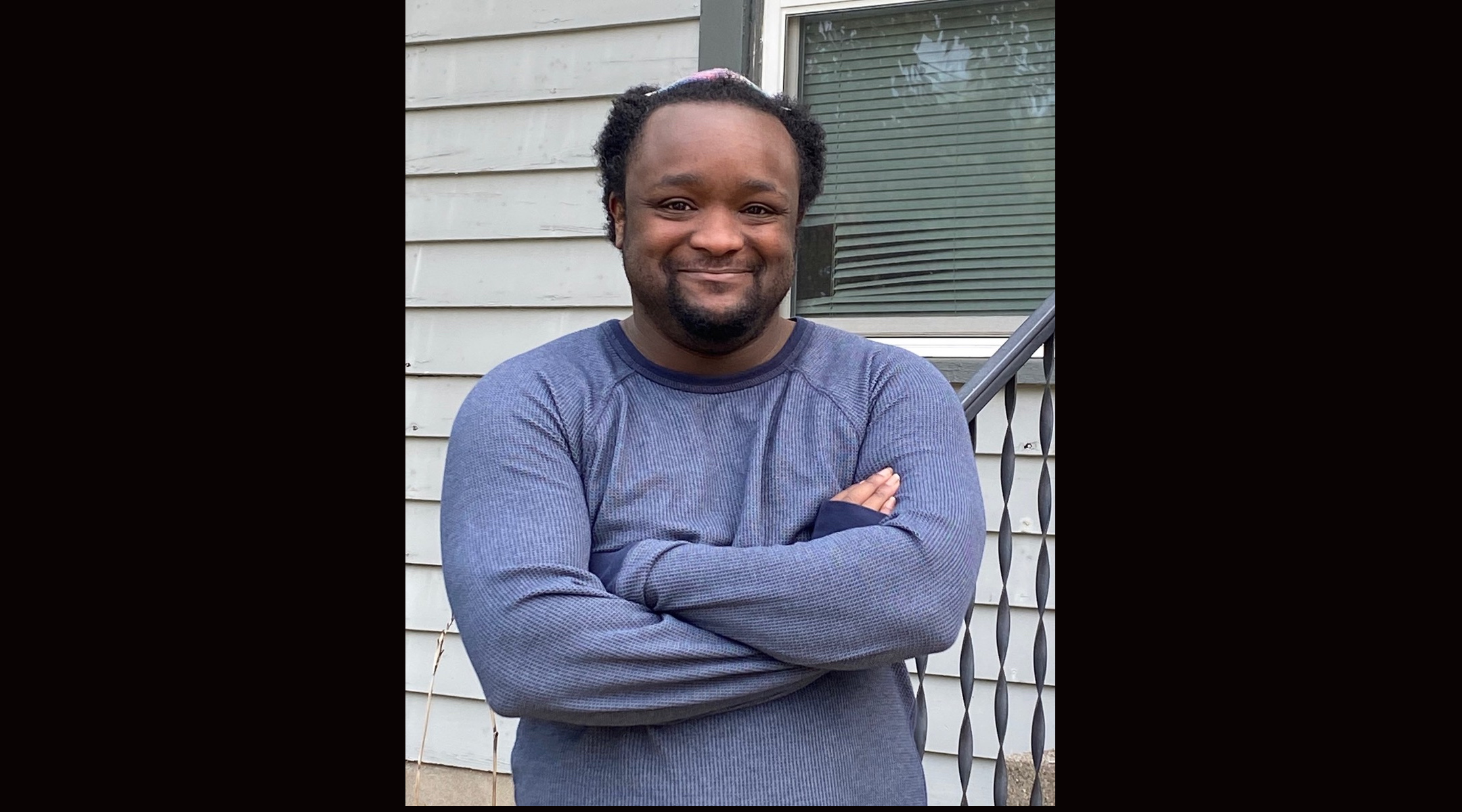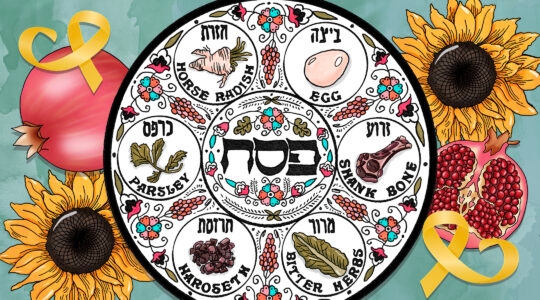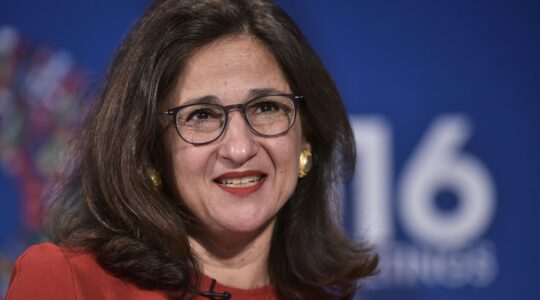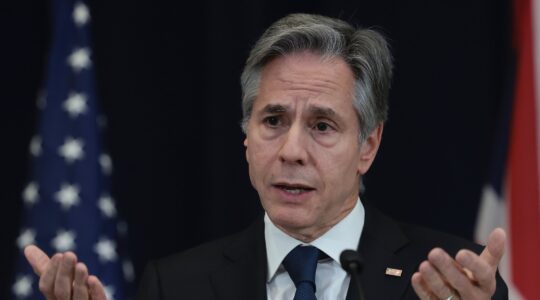(TC Jewfolk via JTA) — Enzi Tanner didn’t watch the trial of Derek Chauvin.
Even as the jury returned guilty verdicts Tuesday afternoon on all three counts against the former Minneapolis police officer — second-degree murder, third-degree murder and second-degree manslaughter — the community safety organizer at Jewish Community Action, a Minnesota social justice organization, had been thinking of issues bigger than the result.
“My biggest concern before was in focusing solely on the trial, it makes us about one incident,” Tanner said. “It’s about that 9 minutes and 29 seconds on May 25. And that’s what it ends up being about and not the broader system. Even in the trial, people are arguing that Derek Chauvin is a rogue police officer, that he’s not typical. And he is.”
For Tanner, a Jew of color, the state of policing and public safety in the country is the intersection of his work as an organizer and who he is as a person. And the April 11 killing of Daunte Wright by a police officer in nearby Brooklyn Center only strengthened his resolve to pursue broader efforts to transform public safety through his work at the Jewish Community Action, which shifted last year to focus squarely on responding to George Floyd’s death. (The officer in the Wright killing has been charged with manslaughter.)
“This last week actually provided more opportunities and more clarity than before,” he said. “Before the murder of Daunte Wright and around the trial, we [were] already planning and trying to work on some political education pieces on what’s next.”
Fueled by a belief that fear is holding back needed changes in policing, Tanner is putting together a workshop for his organization on anti-Black racism, fear and the need to be secure.
“We have a narrative in this country about anti-Black racism and fear, and it allows for that confusion between security and actually being secure,” he said. “Fear is a physical reaction, it’s not just a psychological thing. When we watch scary movies, we actually react to that, so getting in tune with that, and our initial reactions, I just think that’s important.”
RELATED: “‘Believe us’: Black Jews respond to the George Floyd protests, in their own words” (2020)
A virtual training on Sunday started tackling some of the difficult conversations that come around the topic of reimagining public safety. A portion of the training included about 20 minutes of breakout rooms with scenarios of how to practice having conversations about policing.
One of those needed conversations is about the movement to “defund” police in Minneapolis and beyond — a term that Tanner says has a different meaning depending on whom you ask. To him, it means the middle ground between reform, which requires investing more money into police forces, and abolition, doing away with police entirely.
“Folks who want to defund, it’s this middle ground. It’s saying that we have enough resources as a community to provide for what we need,” he said. “When you talk about defunding, you’re talking about reallocating, and as you’re talking about reallocating, to me it actually opens up the world to dreaming of what’s possible. How can we imagine a world in a society that we’ve never seen? And it’s scary as hell.”
For Tanner, the road ahead is certain to be difficult — but it’s one that he sees traversing nonetheless as an action with a deeply Jewish antecedent.
“I just keep imagining our ancestors being at the Red Sea and being like, ‘OK, you go,’ ‘No, you go first.’ And then everyone else is like, ‘This is a really bad idea, y’all. We don’t even know what’s over there. We haven’t even seen it before.’ And I feel like, in many ways, we get a chance to do this, make mistakes, learn and grow,” he said.
The U.S. Justice Department announced Wednesday, a day after Chauvin’s conviction, that it would investigate the Minneapolis Police Department. Previous investigations have ended with agreements, known as consent decrees, between federal and local authorities to changes in policing and oversight.
Regardless of the conviction, Tanner said justice isn’t done.
“There is no justice,” he said, “because there is no redemption or repair in a cage.”
Here are statements from Jewish organizations in Minneapolis and beyond about the conviction of Derek Chauvin in the murder of George Floyd:
Today, Derek Chauvin was convicted on all counts for the murder of George Floyd. He is the first white police officer in Minnesota history to be convicted for killing a Black person.
This was the right decision. Derek Chauvin, and the three other officers who assisted him, should be held accountable for killing George Floyd. For too long police officers have been shielded from consequences for brutality against communities of color.
Despite this ruling, we know that the system that allowed Chauvin to take George Floyd’s life is still in place. Just over a week ago, the same system stole the life of Daunte Wright in Brooklyn Center.
Our current system of policing has caused so much harm. It’s going to take a lot more than the conviction of one man to heal our communities.
In the Jewish tradition, the process of teshuvah, or “repair”, begins with a commitment to never repeat our mistakes. The first step to justice, to repair, is to transform the system so that we never lose another life to police violence again.
At JCA, we believe that this transformation starts with honest and challenging conversations about public safety and policing within our communities. If you would like to be a part of those discussions, click here.
Multiracial Jewish Association of Minnesota
Three hundred and thirty days have passed since George Floyd’s life was taken. For many of us, those past three hundred and thirty days have felt like a lifetime.
The Multiracial Jewish Association of Minnesota supports the conviction of Derek Chauvin on all three counts. This is the first time in Minnesota state history that a white officer has been held accountable for killing a black man. The world can finally call this horrific act of violence against George Floyd what we knew it to be all along: murder.
This verdict cannot restore Mr. Floyd’s life or the great loss to his family. This verdict does not erase the centuries of trauma to the Black community. True justice would mean George Floyd was alive today. And Daunte Wright, Adam Toledo, Philando Castile, Breonna Taylor, and countless others.
These issues are systemic and extend far beyond the bad acts of a few police officers. They are deeply rooted in the law enforcement and justice systems, defined by practices like profiling, disparate treatment, and excessive use of force against Black and brown communities.
The work is far from over. We know that this verdict is an exception to a long history of acquittals and failure to charge police officers. We are cautiously hopeful, knowing that just days ago, Daunte Wright was killed by a Brooklyn Center police officer. With this in mind, we are all called to continue to fight for a more just future. A more fair justice system. A less militant law enforcement system that can truly protect and serve the people. A world where every life reaches its fullest potential.
As an organization, MJA holds firm in our continued commitment to pursuing justice and peace for the BIPOC community–pursuing equity, empowerment, and a true sense of community for BIPOC and JOCSM in every space we occupy. We are eager to work with our allies and supporters in reaching these goals.
We pray:
Please, Holy One, remove all suffering and grief. rule over us, Eternal, You alone, with love and with compassion. Help us achieve justice through the rule of law. Blessed are you, Adonai, who loves righteousness and peace.
Joint statement of the Jewish Community Relations Council of Minnesota and the Dakotas, Minneapolis Jewish Federation and St. Paul Jewish Federation:
While no guilty verdict can bring George Floyd back or make his family and friends fully whole for their loss or unwind the trauma inflicted on the broader African American community, we hope that today’s decision brings some measure of justice, healing, and peace to his loved ones and for all Minnesotans.
We know that the problem is not just the murderous misconduct of a few police officers. Systemic failures in law enforcement, as they are in so many areas of society, are real and harm not just communities, but good officers who are committed to doing the job with integrity and fairness.
As such, systemic solutions which include not just police accountability, but also address disparities in housing, education, employment, healthcare, and income are needed now to ensure that Minnesota is a great place to live for all its residents.
We offer our solidarity to the broader African American community, including Black Jews and Jews of color. Additionally, we pledge to be part of the difficult, but necessary work of repairing the relationship between the police and those they are entrusted to protect and serve.
Finally, we thank the members of our Minnesota National Guard for their service in protecting local communities. We do so with full appreciation that the presence of the Guard on our streets is far from ideal and traumatic to many. We hope that our fellow Minnesotans will come to know the Guard as we know them, neighbors who share our commitment to diversity, inclusion, and service.
When the Temple in Jerusalem was destroyed by the Romans in 70 CE, the rabbis tore their clothes in grief, collapsed into the dust, cried out the names of their dead beloveds, and wailed so fiercely their weeping pierced the universe. They understood the importance of making space for communal grieving, for mourning what and who was lost, in order to sanctify and give meaning to our lives, in order to clear the way for new worlds to be built.
Our colleague, Rabbi Sharon Brous, teaches, “Grief is a spiritual and moral mandate and public grief is an act of rebellion against the world as it is. It means lifting up the story of people who have died. It means saying their names.”
We grieve the deaths of so many Black and Brown and Asian and Native and Muslim and Jewish and immigrant beloveds at the hands of police. We cry their names. George Floyd (z”l). Daunte Wright (z”l). Adam Toledo (z”l). We cry out for lives that were brutally stolen by state violence. We say their names to center their humanity. And, in so doing, reach towards our own.
As the murder trial for Derek Chauvin comes to a close, we know that our hearts are stretched beyond capacity with anguish, grief, rage, despair, fear, conviction.
We recognize and honor the myriad ways grief, rage, exhaustion and hope pour out onto our streets. We recognize and honor the importance of gathering together – in the face of pandemic and violent repression. May the righteous minyan of mourners and justice seekers – thousands-strong – continue in strength, wisdom, and generosity. May all those who are now laid low in sorrow know in their bodies the words of the Psalmist הזורעים בדימעה, ברינה יקצורו – hazor’im bdim’ah, berinah yiktzoru – may those who sow in tears gather again, together, in joy.
Jewish tradition does not demand we have the right answers; Judaism calls us forth to show up for each other, to lament, to pray, to study, to care for each other, to lift our prophetic voices in cries for justice and human dignity, to tend to the wounded and the suffering in our midst.
As we move through these next days, reach out to each other, check in on each other. Breathing wishes of accompaniment and support especially to community members of color and your family members.
In the post-Temple era, one world was dying as a new world was being born. Through this tumultuous moment, we have the vision of a world where every human lives with dignity and compassion, where every human life is valued, where we have eradicated every form and system of bigotry, where every human soul can breathe free. We are not there yet. But we hold each other in our tears and with our hope, with our courage and our action. May we dream a new world into being, a world built on love.
Nearly a year ago, George Floyd died as a result of police violence. His last words uttered underneath the knee of a Minneapolis police officer, were “I can’t breathe.” Today, for Mr. Floyd, we are all taking a breath. A measure of justice was served, which will begin the process of ensuring equal justice to every member of our country. Racial injustice hurts all Americans because it keeps our country from achieving all that it can from simple human acts of kindness to much grander outcomes. But racial injustice has personally and deeply affected communities of color, and our systems must change. As Vice President Kamala Harris said, African-American men are fathers, husbands, brothers, sons, and neighbors. They are human beings. They, and all people, are promised every opportunity our country has to offer, and the time is long past due to make that reality. Our thoughts are with the Floyd family, and our gratitude to the jurors, the brave bystanders, and the clear vision of the witnesses who took the stand to provide a measure of justice.
Jewish Family and Children’s Service of Minneapolis, and the Network of Jewish Human Service Agencies believe in the imperative of Tikkun Olam, repairing the world one person at a time. Today, and every day forward, we commit our work to achieve a perfected world where every human’s worth is seen and valued. We will be active participants in the fight to end racism and achieve public safety and justice for everyone. George Floyd’s life mattered.
The jury’s decision to hold Derek Chauvin accountable for the murder of George Floyd is a critically necessary first step in securing #JusticeforGeorgeFloyd.
And yet, no guilty verdict can change the fact that George Floyd — and Breonna Taylor, Daunte Wright, Adam Toledo, and too many others — should be alive today. Our country’s policing and criminal legal systems have targeted and devalued Black, brown, and Indigenous lives for centuries. The issue is much bigger than one traffic stop, one no-knock raid, one police shooting, one department, or one city. It is long past time for our country to tackle systemic racism, reimagine what public safety looks like, and create transformational change to ensure justice and fair treatment for all people. Black Lives Matter, and our society’s laws, practices, and institutions must reflect that.






